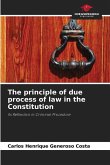A substantial number of inmates confined in our state and federal prisons face outstanding charges in other jurisdictions. Typically, those other jurisdictions will file "detainers" against such inmates. A detainer is a request by the demanding state that its law enforcement authorities be notified by the confining state when the inmate's sentence in the confining state is about to expire. The notification gives the demanding state sufficient time to extradite the prisoner to its jurisdiction if it chooses to prosecute him on the outstanding charge. Prisoners subject to detainers have often had to suffer disabilities because of the detainers and have often experienced difficulty in arranging for speedy trials on their outstanding charges. Recently, there has been considerable legal activity regarding the law of detainers, and the current state of the law is elaborate and complex. The following materials discuss the legal contours of the detainer problem, and explore the way in which the legal process has responded to the difficult issues posed. Hopefully, the materials may shed some light on this murky area and may be of particular use to inmates subject to detainers and to the lawyers and law students representing them. Originally published by the U. S. Department of Justice in 1973, this work includes much information that is still useful for prisoners and their lawyers today.
Hinweis: Dieser Artikel kann nur an eine deutsche Lieferadresse ausgeliefert werden.
Hinweis: Dieser Artikel kann nur an eine deutsche Lieferadresse ausgeliefert werden.








